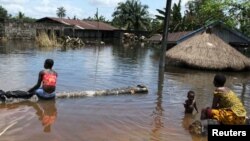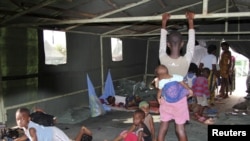ABUJA, NIGERIA —
Flooding in Nigeria has killed nearly 150 people and displaced hundreds of thousands of others this year. As families continue to languish in squalid camps short of food, water, shelter and the most basic of health care, this natural disaster is rapidly turning into a humanitarian crisis.
About 200 women dance outside what used to be a schoolhouse. It is now a makeshift camp for families displaced by the worst flooding Nigeria has seen in half a century. Fifty to 70 people cram into classrooms at night, while many others sleep outside.
Camp officials say distractions like dances or TV help to fend off what sometimes becomes an overwhelming sense of despair and anger among flood victims.
Crowded and squalid camps
In the corridor outside one classroom, a woman named Angela said she lost everything in the floods. Surrounded by a crowd of frustrated displaced families, she said even if the waters recede she has no home to go to and no money to get there.
Other flood victims complain the camps are too crowded and food is unhealthy and scarce. Without enough water, sanitation or medical care, authorities fear outbreaks of disease could make things worse.
In the Niger Delta, camp-leader Chaplain Funge-Owei said they are also in desperate need of mosquito nets to prevent a malaria outbreak.
"The first time we came into this place, I believe the place was fumigated. But now I can see the mosquitoes are all over everywhere and [they are] biting all the victims," said Funge-Owei.
Displaced families
The Nigerian government recently allocated $112 million to help families that have been displaced in 24 of Nigeria’s 36 states since the flooding began in July.
The Nigerian Red Cross said there’s no telling when families will be able to return, and when they do, they will need help rebuilding their homes, and their lives. In the meantime, emergency officials say with tens of thousands of hectares of farmland destroyed, they fear food shortages in the coming months.
Nigerian President Goodluck Jonathan toured the country this month, visiting victims at camps. He called the crisis a “natural disaster” and assured the people that things will get better.
“The greatest problem we will have is not managing the few days you will stay in the camp, but how to manage you when you go back. How you will start life? How your children will go to school? How if you are sick doctors will see you? Let me assure you that government is working. Private individuals are ready to bring money to help,” said Jonathan.
Worsening situation
But this assurance is little comfort to many victims who feel entirely dependent on the government for survival. Perekoerede Lawyer is a fisherman who fled his home two weeks ago and has no idea when he will be able to go back.
“We want the government to look into this camp and bring more food, because people are crying for hunger every day and night,” he said.
As the crisis deepens, some analysts say it is not just the Nigerian government that should be concerned. In his blog this week, John Campbell, a senior fellow at the Council on Foreign Relations and a former U.S. ambassador to Nigeria wrote that the United Nations and other organizations have “sounded the alarm” at the approach of similarly large-scale humanitarian crises in the region. But now many remain silent, he said, while others are oddly quiet.
The Western media, he added, has almost entirely ignored the problem. He said he wonders if news agencies think their audiences do not want to hear “another dreary story out of Africa.”
About 200 women dance outside what used to be a schoolhouse. It is now a makeshift camp for families displaced by the worst flooding Nigeria has seen in half a century. Fifty to 70 people cram into classrooms at night, while many others sleep outside.
Camp officials say distractions like dances or TV help to fend off what sometimes becomes an overwhelming sense of despair and anger among flood victims.
Crowded and squalid camps
In the corridor outside one classroom, a woman named Angela said she lost everything in the floods. Surrounded by a crowd of frustrated displaced families, she said even if the waters recede she has no home to go to and no money to get there.
Other flood victims complain the camps are too crowded and food is unhealthy and scarce. Without enough water, sanitation or medical care, authorities fear outbreaks of disease could make things worse.
In the Niger Delta, camp-leader Chaplain Funge-Owei said they are also in desperate need of mosquito nets to prevent a malaria outbreak.
"The first time we came into this place, I believe the place was fumigated. But now I can see the mosquitoes are all over everywhere and [they are] biting all the victims," said Funge-Owei.
Displaced families
The Nigerian government recently allocated $112 million to help families that have been displaced in 24 of Nigeria’s 36 states since the flooding began in July.
The Nigerian Red Cross said there’s no telling when families will be able to return, and when they do, they will need help rebuilding their homes, and their lives. In the meantime, emergency officials say with tens of thousands of hectares of farmland destroyed, they fear food shortages in the coming months.
Nigerian President Goodluck Jonathan toured the country this month, visiting victims at camps. He called the crisis a “natural disaster” and assured the people that things will get better.
“The greatest problem we will have is not managing the few days you will stay in the camp, but how to manage you when you go back. How you will start life? How your children will go to school? How if you are sick doctors will see you? Let me assure you that government is working. Private individuals are ready to bring money to help,” said Jonathan.
Worsening situation
But this assurance is little comfort to many victims who feel entirely dependent on the government for survival. Perekoerede Lawyer is a fisherman who fled his home two weeks ago and has no idea when he will be able to go back.
“We want the government to look into this camp and bring more food, because people are crying for hunger every day and night,” he said.
As the crisis deepens, some analysts say it is not just the Nigerian government that should be concerned. In his blog this week, John Campbell, a senior fellow at the Council on Foreign Relations and a former U.S. ambassador to Nigeria wrote that the United Nations and other organizations have “sounded the alarm” at the approach of similarly large-scale humanitarian crises in the region. But now many remain silent, he said, while others are oddly quiet.
The Western media, he added, has almost entirely ignored the problem. He said he wonders if news agencies think their audiences do not want to hear “another dreary story out of Africa.”






